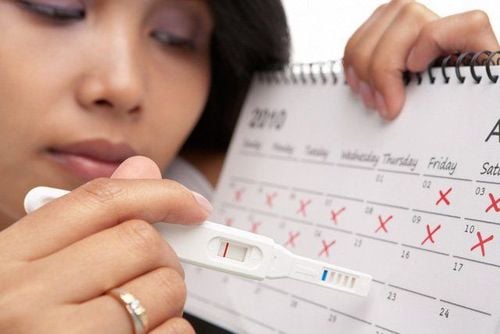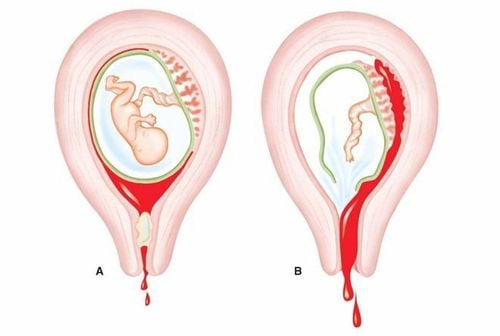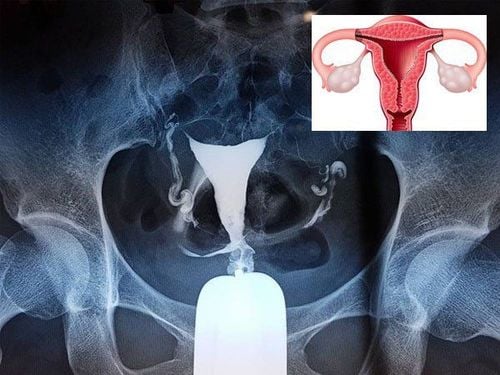This is an automatically translated article.
The article was expertly consulted by BSCKII Nguyen Thu Hoai - Department of Obstetrics and Gynecology, Vinmec Times City International General Hospital.We have received the following question from email: Doctor, I am 40 years old and have 2 children. Normally my cycle is quite regular, only fluctuates 28 - 30 days. However, it has been 1 year, 2-3 months to have a period. Is this menstrual cycle dangerous? I asked what to do to get my period back to normal?
Answer : Thank you for sending us your question. Her symptoms such as irregular periods, missed periods are signs that she is having a menstrual disorder. The doctor will explain in detail and advise treatment options to help you improve this condition.
1. What is considered a menstrual disorder?
Menstrual disorders are common problems in women, especially girls in puberty and girls in perimenopause. If this condition occurs less often and the cause is known, such as eating a lot of hot and spicy foods, menstrual disturbances are only temporary and are not a cause for concern. However, with cases like her, menstrual irregularities for a long time, prolonged menstrual cycle, menstrual disorder is called a gynecological disease.
2. Why do women have menstrual disorders?
Hormonal imbalance During her reproductive period, a woman has to go through many stages including menstruation, pregnancy, lactation, perimenopause, menopause. These landmarks are often associated with a hormonal imbalance in the body, which manifests in the form of irregular or missed periods.
Weight gain or loss Sudden weight gain or loss can also lead to irregular periods because fluctuations in a woman's weight disrupt hormone levels in the body and affect menstruation. Most women who lose weight experience irregular periods, and sometimes women who gain weight also have this problem.
Eating disorders Some eating disorders such as anorexia nervosa or bulimia can also cause irregular periods. Unusual diet and nutrition fluctuates hormone levels and can also adversely affect important body functions, such as basal metabolic rate.
Too much exercise Too much exercise also changes the body's usual activities and causes irregular periods. However, most athletes - who exercise a lot - often face the problem of menstrual disorders.
Thyroid disorders Women with thyroid disorders often have irregular periods. This is because thyroid hormone affects our body's metabolic rate and thus affects the menstrual cycle.
Breastfeeding Breastfeeding also affects hormone levels and disturbs a woman's normal balance leading to changes in the menstrual cycle. Usually, breastfeeding women will have a later period because the prolactin in breast milk slows down the menstrual cycle. Breastfeeding reduces the frequency of ovulation by about a third of normal. After menopause returns, it will take some time for it to stabilize.
Puberty When you first get your period, most girls have irregular periods. This is because the level of new hormones released in the body takes a while to stabilize and form a rule. In general, girls usually spend the first 2-3 years having irregular periods.
Polycystic Ovarian Syndrome Polycystic ovary syndrome occurs in about 10% of women of reproductive age. During this age, the ovaries can produce cysts that increase the amount of estrogen in the body, causing the lining of the uterus to thicken and shed. If this happens, a woman doesn't have a real period because ovulation is irregular. It has many noticeable symptoms including weight gain, acne, frequent missed periods, amenorrhea and hirsutism.
Before menopause Going into perimenopause, women also experience menstrual irregularities. This is normal because since female hormone levels begin to drop, the previous menstrual cycle is disrupted and leads to irregular periods.
Stress Stressful work, illness for many days, stress, ... will make the adrenal gland secrete the hormone cortisol. This hormone has a direct effect on the production of female hormones such as estrogen and progesterone. The influence of these hormones will be the risk of causing hormonal disorders in the female body and affecting your menstrual cycle.
3. Are menstrual disorders dangerous?
Causes Anemia Heavy menstrual bleeding is a cause of anemia, it is the most common cause of anemia (low red blood cells) in premenopausal women. Blood loss of more than 80mL per menstrual cycle can also lead to anemia. Most cases are mild anemia. However, even mild to moderate anemia can reduce oxygen transport in the blood, causing symptoms such as fatigue, dizziness and pale skin, lack of vitality, and even repeated fainting. Severe anemia if left untreated can lead to heart problems.
Affects reproductive health Menstrual disorders can be a manifestation of some gynecological diseases such as uterine fibroids, cervical polyps, ovarian cysts,... Menstrual disorders sometimes make The intimate area is not clean, easy to get infected and lead to some gynecological diseases. Gynecological diseases, if not treated promptly, can easily turn into malignancies and affect reproductive health.
Risk of infertility The risk of infertility, even infertility in people with menstrual disorders is very high. Menstrual disorders are a manifestation of physiological abnormalities in women. Irregular menstrual cycles make it difficult to predict ovulation, reducing the chances of conception. There is a large percentage of women in their 30s and 40s who still have not had children with menstrual disorders. It has been shown that menstrual disorders reduce fertility and have a high risk of infertility.
Influence on beauty Women are called beautiful, so beauty is an issue that any woman cares about. Menstrual disorders make the body tired, pale skin, easily irritable, making women look lifeless and degrading.

4. How to get the period back to normal?
To regulate the menstrual cycle back to normal, you need to have a healthy lifestyle and a reasonable diet. Some things you need to do and pay attention to:
Keep your mind at ease: When the body is in a state of stress, fatigue, stress, insomnia,... can also cause menstrual disorders. Therefore, keeping the mind comfortable, psychologically stable is essential and effective to treat menstrual disorders
Diet full of nutrients: Menstrual disorders cause anemia, fatigue, so A nutritious diet is extremely necessary for women with menstrual disorders. A nutritious diet helps to keep the body healthy, balance psycho-physiology, and help our menstrual cycle return to normal.

Limiting the use of oral contraceptives Contraceptives contain mainly two types of female sex hormones, estrogen and progesterone. Using birth control pills changes hormone levels in the body, and sex hormones have a great influence on the menstrual cycle. When hormones are out of balance, an egg will not be released, causing a missed period or amenorrhea.
Have a reasonable rest mode Working too much makes the body tense, tired, ... causing menstrual disorders. When performing a reasonable rest regime, the body is regulated to a state of balance, body physiology will return to normal, thus treating menstrual disorders effectively. These measures are very simple to implement, they not only effectively treat menstrual disorders but also help keep the body healthy. When taking these measures for a long time but still not effective, women need to go to reputable gynecological examination facilities to be examined and consulted by specialist doctors.
Gynecological examination is an effective method to protect reproductive health against many gynecological diseases that tend to rejuvenate such as cervical cancer. The Department of Obstetrics and Gynecology of Vinmec medical system is satisfied by customers for its service quality and privacy.
A team of highly qualified and experienced doctors: the doctors here are all professors, doctors, specialists I, II, and masters who are well-trained and specialized in hospitals. leading national and international universities. Comprehensive gynecological examination: Provide a variety of gynecological examination packages from pre-marital to post-marital. Customers will receive: Gynecological examination, bilateral breast ultrasound, transvaginal ultrasound of the uterus and ovaries, total urinalysis by automatic machine and test for infertility, syphilis, pre-cancerous cervical cancer screening. Modern equipment system: The most advanced and modern diagnostic and treatment equipment in the world are imported from the US, UK, Germany, Japan and Singapore, on par with leading hospitals. in the area. Ensure patient privacy: Applying a 1:1 medical examination and treatment model (one doctor - one patient), all medical information is analyzed and meticulously evaluated by the doctor after being examined. Absolute security. No separate examination, meeting 5-star standards. To register for examination and treatment with leading doctors in the Department of Gynecology - Vinmec International General Hospital, you can contact the hospital for service.
Please dial HOTLINE for more information or register for an appointment HERE. Download MyVinmec app to make appointments faster and to manage your bookings easily.














